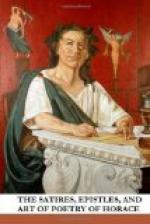D. You praise the life that people lived of old,
When Rome was frugal and the age was gold,
And yet, if on a sudden forced to dwell
With men like those, you’d strenuously rebel,
Either because you don’t believe at heart
That what you bawl for is the happier part,
Or that you can’t act out what you avow,
But stand with one foot sticking in the slough.
At Rome you hanker for your country home;
Once in the country, there’s no place like Rome.
If not asked out to supper, then you bless
The stars that let you eat your quiet mess,
Vow that engagements are mere clogs, and think
You’re happy that you’ve no one’s
wine to drink.
But should Maecenas, somewhat late, invite
His favourite bard to come by candle-light,
“Bring me the oil this instant! is there none
Hears me?” you scream, and in a trice are gone:
While Milvius and his brother beasts of prey,
With curses best not quoted, walk away.
Yet what says Milvius? “Honest truth to
tell,
I turn my nose up at a kitchen’s smell;
I’m guided by my stomach; call me weak,
Coward, tavern-spunger, still by book you’ll
speak.
But who are you to treat me to your raps?
You’re just as bad as I, nay worse perhaps,
Though you’ve a cloak of decent words, forsooth,
To throw at pleasure o’er the ugly truth.”
What if at last a greater fool you’re found
Than I, the slave you bought for twenty pound?
Nay, nay, don’t scare me with that threatening
eye:
Unclench your fist and lay your anger by,
While I retail the lessons which of late
The porter taught me at Crispinus’ gate.
You’re no adulterer:—nor a thief
am I,
When I see plate and wisely pass it by:
But take away the danger, in a trice
Nature unbridled plunges into vice.
What? you to be my master, who obey
More persons, nay, more things than words can say,
Whom not the praetor’s wand, though four times
waved,
Could make less tyrant-ridden, less enslaved?
Press home the matter further: how d’ye
call
The thrall who’s servant to another thrall?
An understrapper, say; the name will do;
Or fellow-servant: such am I to you:
For you, whose work I do, do others’ work,
And move as dolls move when their wires we jerk.
Who then is free? The sage, who keeps in check
His baser self, who lives at his own beck,
Whom neither poverty nor dungeon drear
Nor death itself can ever put in fear,
Who can reject life’s goods, resist desire,
Strong, firmly braced, and in himself entire,
A hard smooth ball that gives you ne’er a grip,
’Gainst whom when Fortune runs, she’s
sure to trip.
Such are the marks of freedom: look them through,
And tell me, is there one belongs to you?
Your mistress begs for money, plagues you sore,
Ducks you with water, drives you from her door,
Then calls you back: break the vile bondage;
cry
“I’m free, I’m free.”—Alas,
you cannot. Why?
There’s one within you, armed with spur and
stick,
Who turns and drives you, howsoe’er you kick.




